|

SWIMMING TEMPLE: Beijing's ‘Water Cube' Aquatics Center witnessed 21
new world records during the Beijing Olympics
The water in the Water Cube pool is tranquil now. The predatory power of American Michael Phelps churning his way to an unprecedented eighth gold medal in the men's 4x100 meters medley relay, took swimming to new heights. And there is no doubt that Beijing's bubble-shaped aquatics center helped in the process of the 21 new world swimming records.
During the nine-day swimming competition, a total of 21 world records were broken at the venue, equalizing the collective total of Athens (8) and Sydney (13). The longest-surviving world record, in women's 800 meters freestyle, standing for 19 years, was broken by Rebecca Adlington from Britain in 8 minutes, 14.10 seconds.
"We are calling it the ‘swimming temple' of the world," Cornel Marculescu, Executive Director of the aquatic sport governing body FINA, told reporters covering the Olympic swimming competition. The record-breaking spree has sparked many debates on reasons why performances had been so speedy here in the Water Cube.
Deep pool
According to FINA regulations, the depth of a standard swimming pool ranges between 2 and 3 meters. The pool in the Water Cube is 3 meters in depth and has 10 lanes rather than the usual eight.
Some people therefore attribute the good results in the Beijing Games to the pool, because deeper and wider pools allow the waves to dissipate to the bottom and both sides, leading to less water disturbance to swimmers.
"It doesn't beat you up like shallow water does," U.S. coach Eddie Reese told China's Xinhua News Agency.
The pool in the Water Cube also has perforated gutters on both sides to absorb the waves aside from the wave-flattening lane markers, which use spinning plastic baffles to suck energy from waves.
Bubbly feeling
Lighting is allegedly a vital factor to Phelps' amazing achievement in the Water Cube. According to him, the lamplight and natural light high up on the roof and the "bubbles" refracted, which he saw when he was swimming on his back, made him "feel great."
The "bubbles" mentioned by Phelps is the membrane structure of the Water Cube. The thin transparent material, called ETFE (Ethylene Tetrafluoroethylene), is segmented into 3,000 air-filled cushions that let in light but hold in heat, which helps swimmers feel more comfortable.
Japanese Olympic champion swimmer Kosuke Kitajima, who broke the world record in men's 100 meters breaststroke and the Olympic record in 200 meters breaststroke, said it was very comfortable when swimming in the "bubbles," which made him feel like a fish in water.
Comfortable temperature
Cold water could lead to the waste of swimmers' energy, while hot water would prevent the swimmers from generating heat.
The Beijing pool's temperature is kept at between 26.5-26.9 degrees Celsius (79.7-80.4 degrees Fahrenheit), which is considered ideal.
"The pool is great. The water temperature is awesome. It feels fast," Greek swimmer Apostolos Tagkarakis was quoted by Xinhua as saying after his first training session at the Water Cube.
Good geomantic location
Some also believe that the location of the Olympic venues bring good luck for the athletes.
According to fengshui, an ancient Chinese system of designing buildings and space according to the flow of energy aimed at achieving harmony with
| 